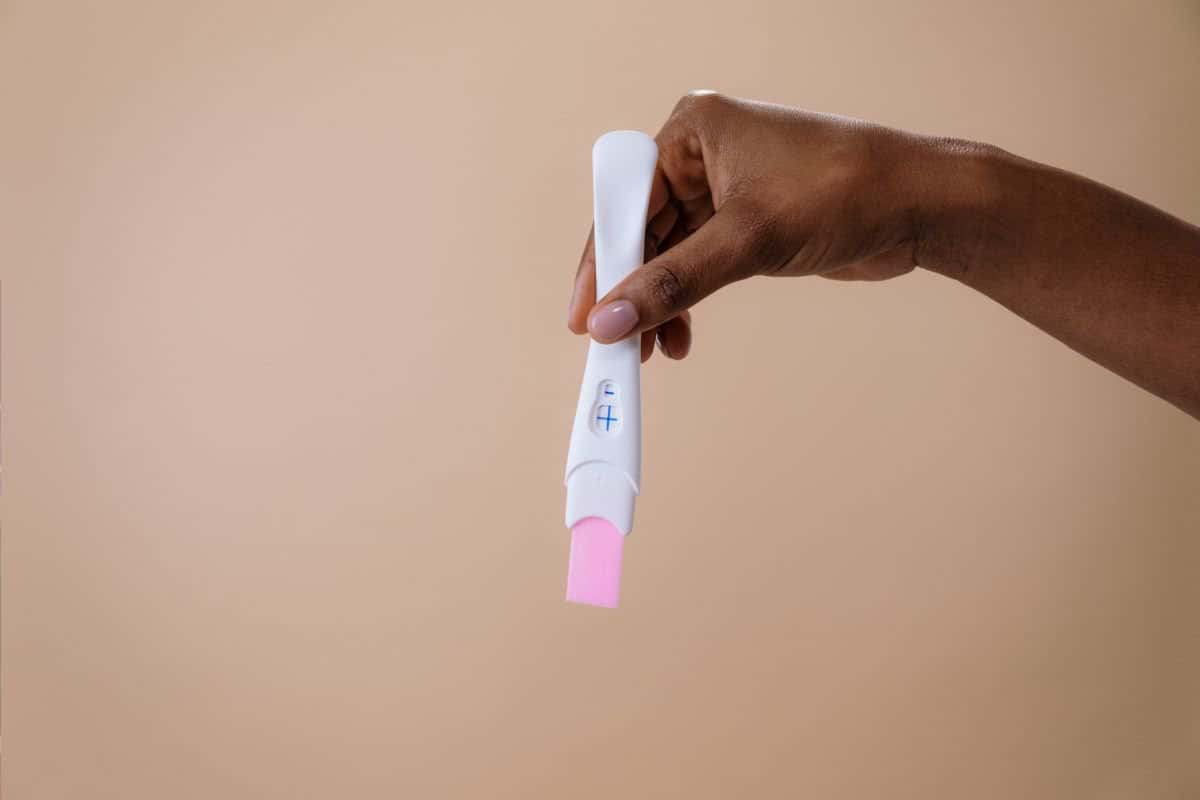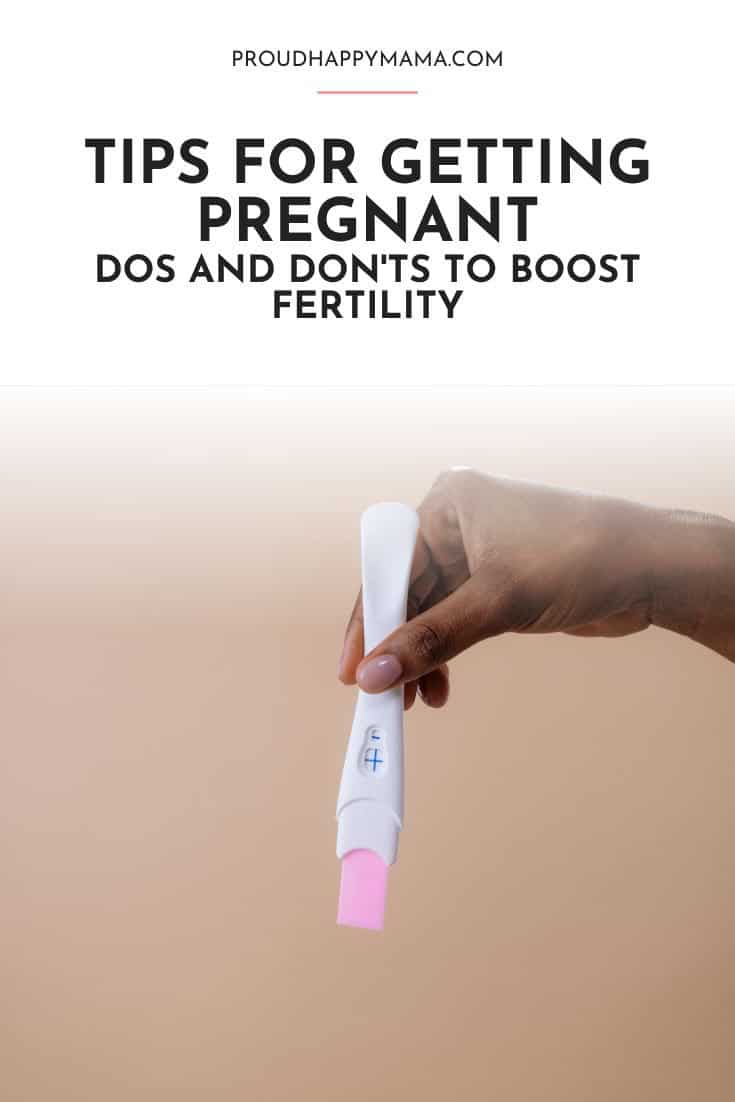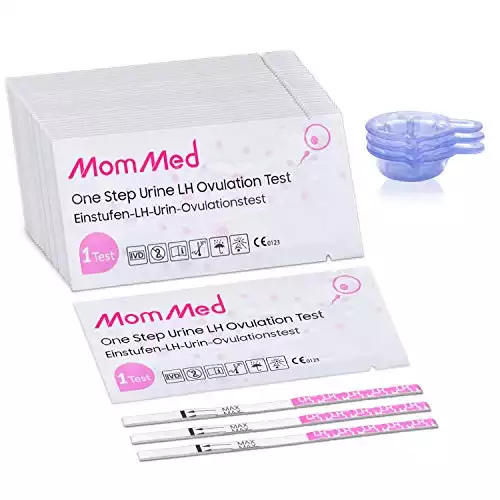Tips for Getting Pregnant
Are you looking for the best tips for getting pregnant?
Then let us help guide you on the dos and don’ts to boost fertility!
Over the years, countless studies and research have been conducted to help couples who are trying to conceive.
On the one hand, they revealed several common habits that can have a negative impact on fertility. On the other hand, they discovered lots of factors that can lead to a quicker pregnancy.
Continue reading to learn about the 5 key tips on getting pregnant, as well as what to avoid during this period!
And if you love this guide on tips to getting pregnant, then you’ll love our guides on preparing for baby checklist and questions to ask your partner before having kids.
This post contains affiliate links. See our full disclosure here

5 Scientifically Backed Tips for Getting Pregnant
Let’s start by going over five tips that have been proven to increase a couple’s chances of getting pregnant:
1. Keep Track of Your Cycle
The first thing you should do is create a timeline for your menstrual cycle. You’ll need to keep track of when your ovulation begins because your chances of becoming pregnant are extremely high during this time.
Simply put, ovulation is a phase of the menstrual cycle in which a mature egg is released from the ovary. The egg will then travel to the fallopian tube, where it’ll stay for 12 to 24 hours before continuing on its journey.
If the egg is fertilized by a sperm, it may travel to the uterus and implant into the uterine lining to prepare for pregnancy. Whereas, if the egg isn’t fertilized within the 24-hour window, it’ll disintegrate and be shed along with the uterine lining during your menstrual period.
How to Tell If You’re Ovulating
You may be wondering now how to time your ovulation. So, here are three pointers to help you increase your chances of catching that 24-hour window:
1. Make a Menstrual Calendar
In general, ovulation starts on the 14th day after your first day of menstrual bleeding. This is based on a 28-day menstrual cycle. However, since menstrual cycles vary in length from one woman to another, it’s best to keep a schedule to track yours.
You can easily do so by making a menstrual calendar and noting when your menstrual period begins. Alternatively, you can use an ovulation and period tracker app to record all of your cycle data each month.
2. Look for Indicators
Ovulation manifests itself in three distinct ways. The first and most obvious sign is a change in your cervical mucus, a.k.a vaginal secretions. They’ll become thin, clear, slippery, and stretchy when you’re most fertile.
The second indicator is ovulation pain, which is felt by some women as a mid or one-sided twinge in the lower abdomen.
The last thing you might experience is an increase in basal body temperature that lasts for three days or more.
3. Use Ovulation Tests
Ovulation tests, also known as ovulation predictor kits, can help you in determining your ovulation period. They simply detect a luteinizing hormone in urine and give you the green light if it’s present. To clarify, this hormone is required for egg release during ovulation.
The MomMed Ovulation Test Strips provide a reliable and user-friendly solution for tracking your ovulation.
With over 99% accuracy, they offer precise results that can be easily obtained from the comfort of your home. The inclusion of urine cups is a convenient bonus, and the packaging ensures safety and hygiene.
These test strips have a 25mIU sensitivity level, reducing the risk of false positives.
The product also comes with a handy time tracking booklet and clear instructions to aid in accurate tracking and understanding of results.
GET 15% OFF BY USING THE CODE: PROUDMAMA15 (when you buy direct from mommed.com)
2. Have Sex Regularly
When your ovulation date approaches, you should begin having sex regularly, at least three times per week. Ideally, have sex frequently the five days before the expected ovulation date and on the day of ovulation.
Sperm can survive for up to five days inside a woman’s body. Thus, the more often you have intercourse before ovulation, the greater your chances of becoming pregnant.
Remember to lie down for 10-15 minutes after sex to allow the sperm to reach the cervix. There’s a myth that staying in bed with your legs raised increases your chances of getting pregnant. Nonetheless, there’s no scientific evidence to back up this advice.
3. Improve Sperm Health
Having healthy sperm plays a significant role in increasing the chances of conceiving. Here are the six most important tips for boosting sperm health:
- Don’t smoke or use illicit drugs as it’ll most likely result in a low sperm count
- Keep a healthy diet rich in antioxidants, such as fruits and vegetables
- Avoid exposing your scrotum to heat since it can reduce sperm production, so don’t:
- Wear tight pants
- Overdo saunas, jacuzzis and hot tubs
- Place your laptop on your lap
- Put your phone in a pocket near your testicles
- Limit alcohol consumption as excessive drinking reduces testosterone and thus sperm formation
- Exercise regularly to boost sperm count and quality
- Get enough sleep, as too little or too much of it can lead to poor semen quality
4. Engage in Moderate Exercise
Moderate exercise increases fertility in women of all body types. On the other hand, vigorous exercise can significantly reduce the likelihood of normal-weight, not overweight, women becoming pregnant.
Simply put, moderate exercise is any activity that causes your heart rate to rise, your breathing to become faster, and your body to become slightly warm. To put it another way, you shouldn’t be completely out of breath while doing it.
The American College of Obstetricians and Gynecologists (ACOG) recommends 150 minutes per week of moderate physical activity. Of course, you can divide the total number of minutes recommended into 30-minute of exercise per day, five days a week.
Here are some great examples of moderate exercises:
- Brisk walking
- Aerobic dancing
- Gentle cycling
The ACOG also suggests doing muscle-strengthening exercises at least twice a week. Some excellent muscle-strengthening activities include:
- Yoga
- Pilates
- Barre
5. Maintain a Healthy Diet
A well-balanced diet not only increases fertility but also builds a proper store of minerals and vitamins, which contributes to the development of a healthy baby.
Typically, a healthy diet for women trying to conceive should include seven essential nutrients. We’ll list them below, along with some foods that are rich in them:
- Antioxidants: Fruits, vegetables, nuts
- Folate: Leafy greens, legumes, beetroot, citrus fruits
- Iron: Spinach, quinoa, shellfish, pumpkin seeds
- Calcium: Dairy products, beans, lentils, almonds
- Fiber: Whole Grains, banana, broccoli, avocado
- Omega-3 fatty acids: Seafood, flaxseed, chia seeds, walnuts
- Protein: Red and white meat, fish, peanuts, black beans
Increase your consumption of fruits and veggies as much as possible. They’re packed with vital nutrients that are necessary for a successful pregnancy attempt.
If you have or suspect that you have an eating disorder such as anorexia or bulimia, you should consult a doctor to help you plan a healthy diet.
Similarly, if you’re a vegetarian, vegan, or have any other dietary restrictions, you should speak to an expert. That is so they help you find adequate substitutes for the foods you’re unable to consume.
Finally, avoid extreme dieting, such as crash diets, which can negatively impact your fertility.
3 Things Women Should Avoid When Trying to Conceive
Now, let’s walk you through three things you should limit as you prepare your body for hosting a baby:
1. Smoking
Cigarette smoking has a wide range of effects on a woman’s fertility. To begin, the chemical substances found in cigarettes, such as nicotine and cyanide, have a direct relation to hastening egg loss.
In the short term, this reduces the chances of conceiving. In the long term, menopause usually arrives 1-4 years earlier in smokers than in nonsmokers. This explains why women who smoke have approximately twice the rate of infertility as women who don’t.
In fact, fertility treatments such as IVF require much more effort to be successful in smokers. As a result, even with fertility treatments, they have a 30% lower chance of becoming pregnant.
2. Alcohol
Both moderate and heavy alcohol intake has been shown to reduce a woman’s odds of conceiving. For context, moderate consumption is defined as 3-6 drinks per week, while heavy consumption is defined as more than 6 drinks per week.
In simple terms, drinking during the post-ovulation period disrupts a woman’s hormonal sequence, which is required for conception. To be more specific, women who drink have a 44-49% lower chance of becoming pregnant than non-drinkers.
These statistics are based on a study published in the journal Human Reproduction. It’s worth noting that during this study, researchers also discovered that the type of alcoholic beverage that participants drank didn’t affect the results.
Therefore, try to keep your alcohol intake to less than half a drink per day during and after ovulation. During the remaining phases of your menstrual cycle, you can have up to one drink per day.
3. Stress
Generally speaking, stress encourages unhealthy habits or behaviors that contribute to infertility. For example, when you’re stressed, you may have difficulty sleeping, following a healthy diet, or engaging in exercise. Not to mention that it can be a trigger for drinking or smoking.
On top of that, a few studies have now found a link between a woman’s stress and a lower chance of getting pregnant.
One of these studies looked for alpha-amylase, an enzyme associated with stress, in women’s saliva. The findings revealed that women with this enzyme present took 29% longer to conceive than others.
Leading a healthy lifestyle is one of the most effective ways to reduce stress. Make sure you eat healthy foods and get enough exercise every day.
Final Thoughts on tips on getting pregnant
By now, you’re well aware of the best tips for getting pregnant. Hopefully, you’ll be among the 80% of couples who were able to conceive after only six months of trying!
Just remember to consult with your doctor before beginning your attempts so that he can prescribe the necessary prenatal vitamins. You should also discuss any underlying medical conditions with him in order to determine the safest course of action.
And if you’re looking for more pregnancy related content, we recommend checking out our guides on baby items starting with a to z checklist, things new moms need for themselves, pregnancy announcement ideas, and sweet new baby quotes.


